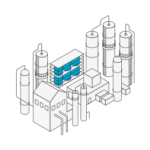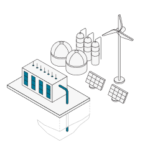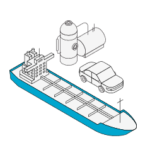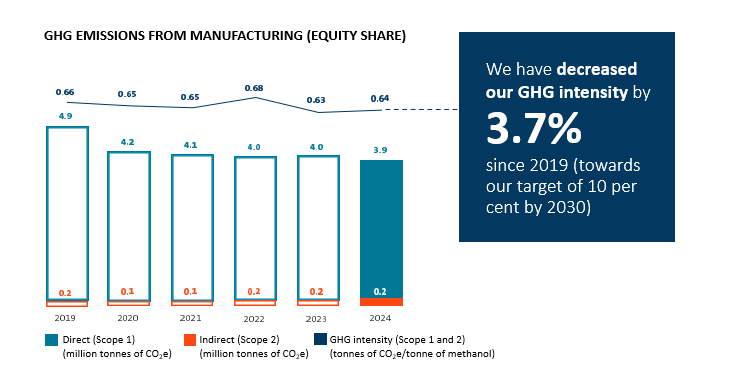At Methanex, we are committed to continuing to operate and invest in our manufacturing assets to achieve greenhouse gas intensity reductions and position us for success in years to come. As part of our planning processes, we take time to understand how climate change and the energy transition may impact our business and develop action plans to mitigate risks or allow us to take advantage of opportunities.
We are committed to playing an active role in the transition to a low-carbon economy by leveraging our existing production assets and collaborating with government and industry. Our objective is to drive solutions that can meet the growing demand for our product in ways that support the environmental commitments of our company, industry, and customers.
Our approach to the transition to a low-carbon economy
Although we do not have a formal transition plan, we continue to take a pragmatic approach to emissions reductions and consider the speed of the energy transition on our business strategy. Three pillars guide our approach to the transition to a low-carbon economy:
 |
Reducing emissions from our operations
|
 |
Progressing low-carbon solutions
|
 |
Growing demand for methanol
|
Reducing emissions from our operations
The first pillar in our approach is to invest in projects and technologies that reduce the emissions from our manufacturing and shipping operations.

| Reducing-intensity expansion projects | Best-in-class technology for growth projects; the G3 plant has one of the lowest emission intensity profiles in the industry. |
| Operational improvements at manufacturing sites | Systematically identify, evaluate and implement efficiency and emissions reduction projects; invested more than $15 million of capital into energy efficiency and reliability projects with GHG reduction benefits at existing sites. We entered into a renewable electricity contract, backed by Renewable Energy Certificates, in Geismar to cover 25 to 30 per cent of one plant’s electricity requirements starting in late 2024. |
To learn more, visit pages 31 to 32 of the 2024 Sustainability Report.
Progressing Low Carbon Solutions
Our manufacturing facilities have a lifespan of several decades, and many parts of the process to make methanol remain the same regardless of feedstock used. For these reasons, we are evaluating the possibility of modifying existing assets to produce low-carbon methanol in the near- to medium-term. This approach is more cost effective and can have a lower environmental impact than building new facilities due to reduced need for construction materials and equipment. We are currently evaluating the following decarbonization levers:
| Carbon Capture Utilization and Storage (CCUS) | Announced a Pre-FEED study at our Medicine Hat site with Entropy Inc, which would allow for captured CO₂ to be reused for producing 50,000 tonnes of methanol annually, with the remainder sequestered underground. We are also evaluating ways to increase the scope of the project. |
| RNG supply contract for Geismar | In 2024, we executed a multi-year renewable natural gas contract that will allow us to produce 40,000-60,000 tonnes of low carbon methanol from 2025-2028 at our Geismar facility. |
| Contracts and offtakes | We continues to evaluate the economic feasibility of low-carbon methanol projects, discuss the green premium with customers, and seeks to secure agreements to procure or produce low-carbon methanol. Our work also includes evaluation of green methanol offtakes to meet customer interest as this demand grows. |
To learn more, visit pages 32 to 34 of the 2024 Sustainability Report.
Growing demand for methanol
As an essential chemical building block and transition ready fuel, we believe there are substantial opportunities for methanol. Our commitment to growing demand for methanol is a key pillar in our approach to the transition to a low-carbon economy. We continue to advocate for the use of low-carbon methanol and leverage our investments and existing assets to continue growing the demand for conventional and low-carbon methanol both as a fuel and a chemical feedstock.
| Collaborating with our value chain | We are contributing to the work of the Methanol Institute, in their consultative status with the International Maritime Organization, and their discussions about alternative fuels and advocating for the benefits of methanol. We also serve as Mission Ambassador for the Maersk Mc-Kinney Moller Center for Zero Carbon Shipping. |
| Being an early adopter of dual-fuel technology | Waterfront Shipping’s early adoption of dual-fuel methanol ships has been critical in proving the benefits of the technology. 19 of Waterfront Shipping’s 33 operating vessels are dual-fuel. |
| Working with marine shipping companies | Our low-carbon solutions team has been engaging with major international shipping companies about their needs and have several memorandums of understanding in place to further those discussions. |
To learn more, visit pages 34 to 37 of the 2024 Sustainability Report.

